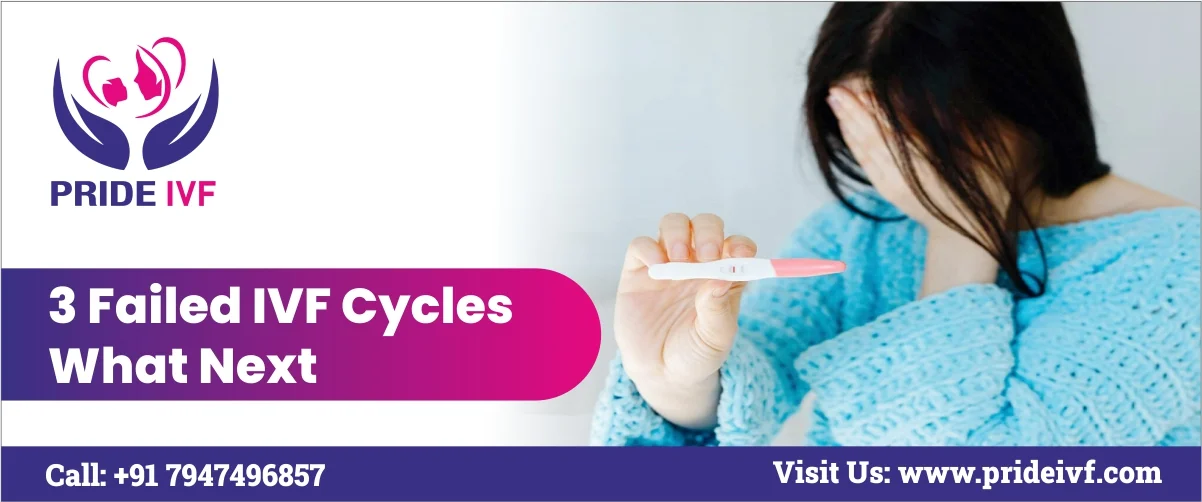The success of In Vitro Fertilization (IVF) procedure differs for patients. While it has an impressive success rate, several patients may experience disappointing outcomes, spanning cycles. While several couples and individuals may experience one failed IVF cycle, others may experience as many as three failed IVF cycles. It’s essential to understand it’s possible to have as many as three failed IVF cycles, but that does not mean you don’t have another chance at experiencing parenthood. This blog explores what can cause 3 failed IVF cycles, and the next steps after 3 failed IVF cycles. Consult Pride IVF Centre in delhi today.




Causes of 3 Failed IVF Cycles
Failed IVF, especially three consecutive failures, can have various causes. The doctors determine the potential cause of the failed cycle to plan the proceeding treatments better and prevent a failed procedure in the future. Listed below are some factors that may cause the IVF procedure to fail:
- Age: Women of advanced maternal age may have eggs of compromised quality. In addition, their quantity of eggs may also be low. This can cause a decline in healthy embryo development. To know more about this read “IVF success rate by age“
- Ovarian Reserve: A reduced ovarian reserve in women can impact the number and quality of eggs retrieved for IVF. This is often indicated by lowered levels of anti-Mullerian hormone (AMH) and/or Antral follicle count (AFC).
- Sperm Quality: If the sperm used in the procedure had low count or motility, fertilisation and embryo development may be impaired.
- Quality of Embryo: The quality of an embryo is measured by assessing its morphology or chromosomal abnormalities. Poor embryo quality can result in failed implantation or miscarriage early in the pregnancy. Sometimes transferring of a good embryo may also lead to IVF failure. To know more about this read “Why Does IVF fail with Good Embryo”
- Uterine Abnormalities: Any structural abnormalities of the uterus can also impact the success of in-vitro fertilisation. These may include uterine fibroids, polyps, or adhesions.
- Hormonal Imbalance: Several women have hormonal uterine abnormalities. This may include irregularities in hormone levels. Any such hormonal abnormalities due to polycystic ovarian syndrome (PCOS) can impact ovulation, egg quality, and endometrial receptivity, causing failure of IVF.
- Endometrial Receptivity: Abnormalities in the receptivity of uterine lining and improper endometrial lining can impact successful embryo implantation. This is another cause of 3 times IVF failure. (Why IVF Fails?)
- Genetic Factors: Genetic mutations and chromosomal abnormalities are also linked with IVF failure. They can impact embryo development and hamper implantation. In some cases, they may also cause miscarriages. Also Read: How Soon After Failed Frozen Embryo Transfer Can I Try Again?
- Lifestyle Factors: Several lifestyle factors, including smoking, unmonitored alcohol consumption, poor dietary habits, and excessive body weight, can impact IVF success.
- Stress: Stress, especially chronic stress, in addition to anxiety, depression, and other related conditions, can impact IVF success rates. Therefore, women are advised to resort to stress-controlling measures when they’re undergoing IVF, as well as afterwards.
- Unexplained Reasons: Sometimes, the cause of IVF failure remains unknown. The procedure fails instead of extensive testing. This is referred to as unexplained infertility.
Lets get started
What Happens After 3 Failed IVF Cycles?
After three consecutive failures of IVF, the doctor will thoroughly review your health to rule out potential issues. In the review, they may look at the quality of eggs, sperms, and embryos, uterine receptivity, and other factors. Based on their review, they may also suggest additional tests, including hormonal assessments, genetic testing, uterus tests, etc.
They may then adjust the treatment accordingly, involving changes to medication protocols, procedure timing, and so on. The aim is to improve the procedure’s chances of success next time. In addition, the doctor may also discuss what happens to your body after failed IVF to plan the alternative treatment options.
Exploring Options After 3 Failed IVF Cycles
While you may feel disappointed after an unsuccessful IVF attempt, you should know you’d most likely have other options open. The doctor, after a careful assessment of your health and determining what may have caused IVF to fail, will discuss other options with you. There are multiple questions to ask the doctor after a failed cycle. In addition, you may need to figure out what to do next. Here’s what you can expect or do:
- Take A Break: After three failed cycles, the doctor may ask you to take a break for a while. During this period, they may recommend you to take care of your health, and optimise your health to prepare for another IVF cycle or other options.
- Emotional Support: It’s normal to feel distressed after 3 IVF cycles. The process may take a serious toll on your mental health, so it’s advisable to seek ample emotional support if the procedure fails. There are multiple stages of grief after failed ivf. Talk to your partner, friends, and family, or seek professional support. You can also join support groups to connect with other women who’ve had similar experiences.
- Treatment Adjustment: If the doctor finds issues in the diagnostic tests that can be fixed with treatment adjustments, they may suggest that. They may ask you to alter the medication’s dosage or timing.
- ART with Donor Eggs or Sperms: The doctor may suggest using donor eggs or sperm for successful IVF in the next cycle. This can prove to be a viable option for those who have issues with eggs or sperm quality.
- Adoption: If your reports show issues with health that might cause other procedures to fail as well, you can explore the option of adoption. It’s suitable for individuals who do not want to explore other fertility treatments.
Moving Forward
Three failed In Vitro Fertilisation cycles can be distressing, but you should not give up and try to move on. There are several other options to help you experience the joy of parenthood. You must consult the best IVF doctor in Delhi, discuss what to do next, and think thoroughly before taking the next steps. It would help if you focused on your physical as well as mental well-being during this time.




